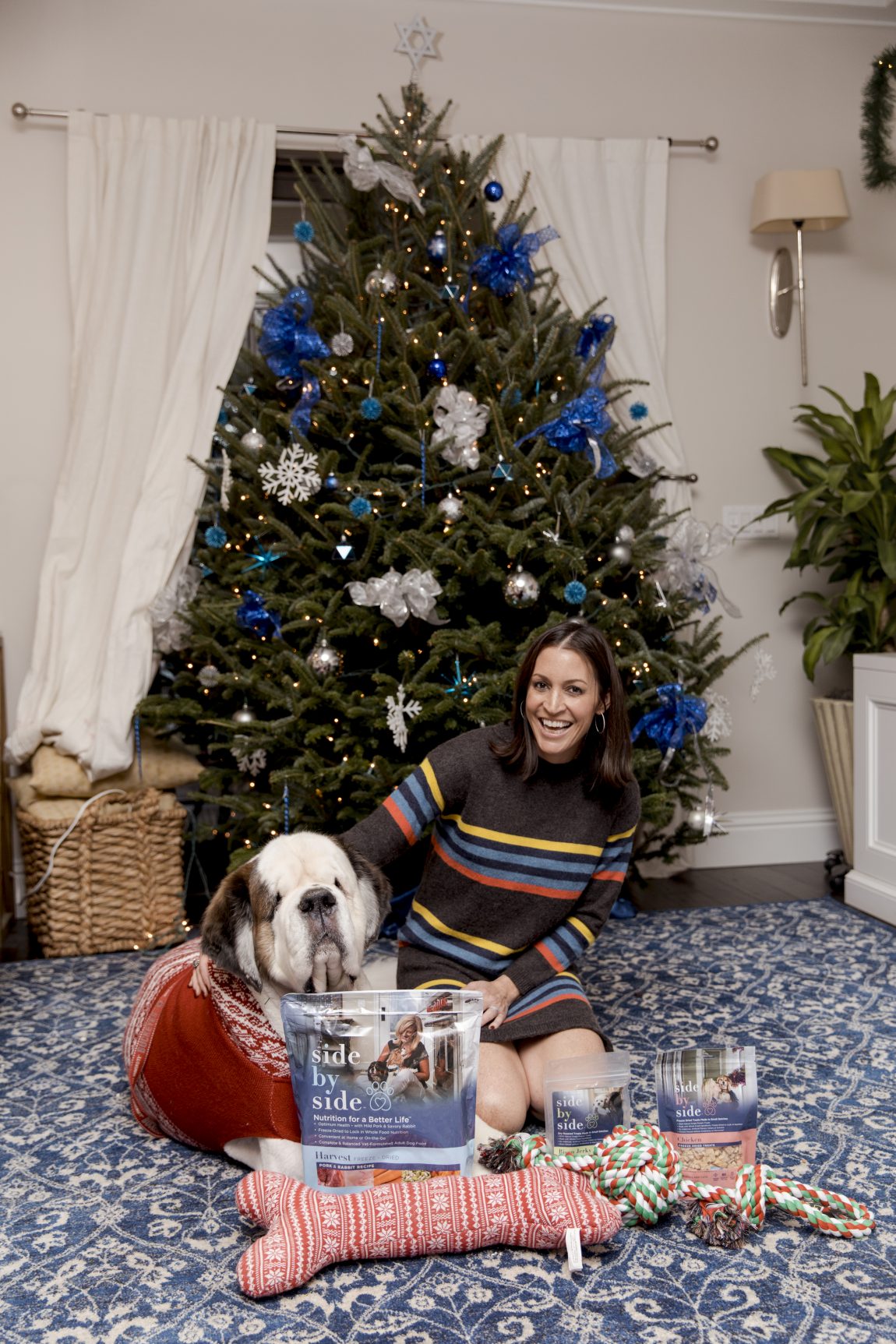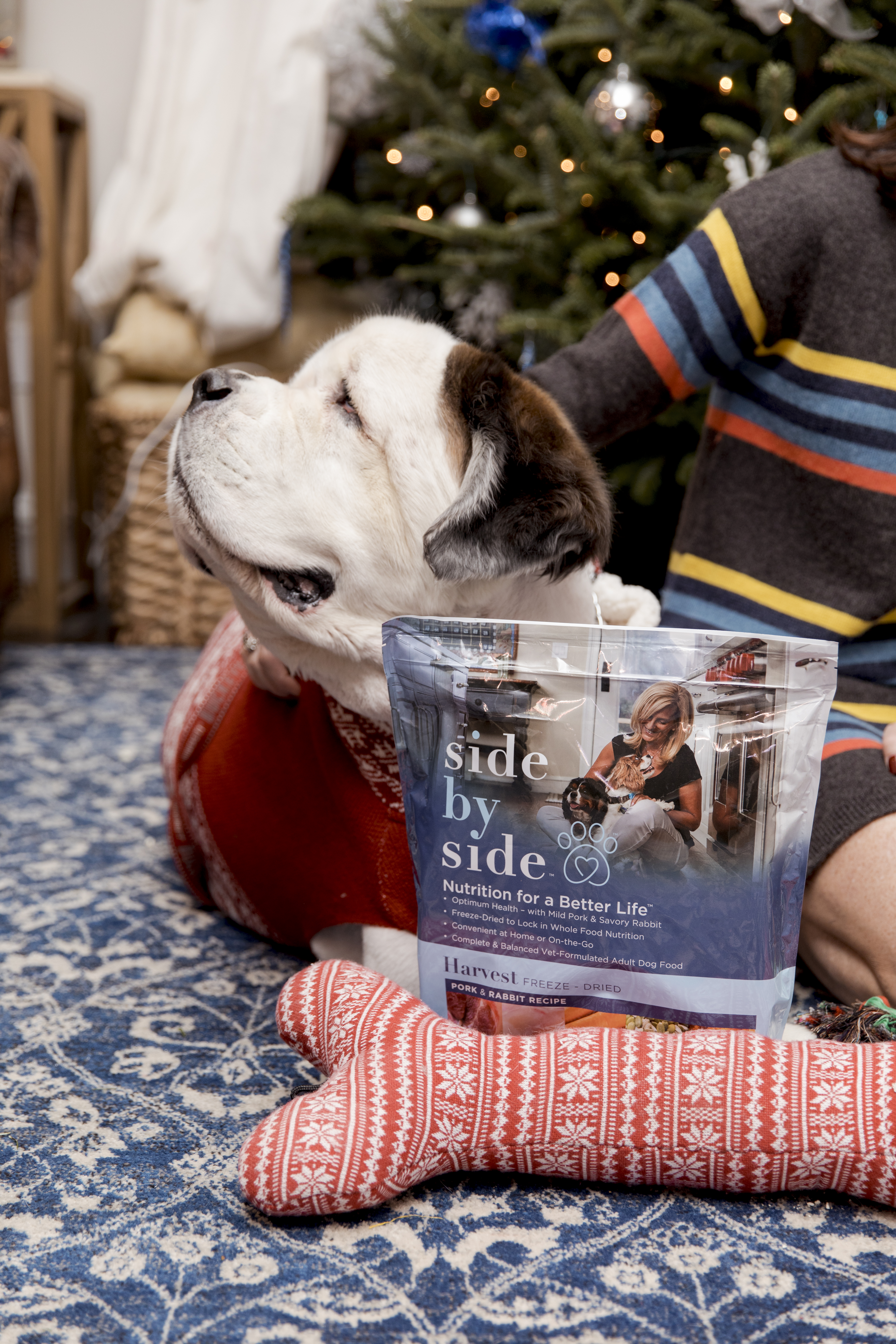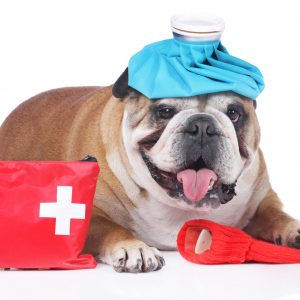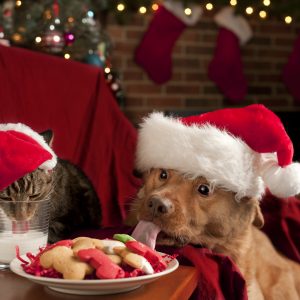
Emergency Vet: 5 Common Holiday Pet Emergencies
Hi everyone! So in case you didn’t know already, I LOVE THE HOLIDAYS! But this time of year tends to be crazy at my animal hospital with a lot of emergency vet visits. In fact, pet emergencies at the hospital nearly double during the holidays.
Whether it’s tinsel on the tree or some delicious Christmas cookies, pets eat EVERYTHING, and they definitely do not discriminate. During the holidays, there’s always a smorgasbord of yummy delights and potentially hazardous decorations around to tempt our pets.
Because I love all the entertaining, decorations, songs, parties, family, and friends that make the holidays so fun and warm, I really want to keep you and your pet celebrating at home and away from the emergency vet this year. Let’s get started with these 5 common holiday pet emergencies!
1. Vomiting, Diarrhea, and Pancreatitis
I see more upset bellies this time of year than during any other time. Most of the gastrointestinal upsets I see are caused by a food indiscretion (eating something they do not normally eat), stress (out of town guests, changes in schedule, and holiday commotion), and parasites. Mild upsets may cause some vomiting and diarrhea and may not warrant a trip to the emergency vet.
Pancreatitis, however, is a more serious condition. The pancreas is an organ that serves many functions. It produces and secretes digestive enzymes, aiding in food digestion, and produces insulin, which is responsible for balancing your pet’s blood sugar levels. Pancreatitis occurs when your pet’s pancreas becomes inflamed and irritated. With this condition, the normally inactive digestive enzymes become activated and secreted into the gastrointestinal tract resulting in pain, inflammation, and swelling of the pancreas and intestines. High fat treats and foods can be a predisposing factor for pancreatitis. Keep pets away from the following foods to avoid the emergency vet this holiday season:
- Rich and fatty foods can cause problems ranging from stomach upset to more serious illnesses such as pancreatitis, resulting in pain, vomiting, and dehydration.
- Uncooked yeast dough can expand and produce gas in the digestive system, causing pain and possible rupture of the stomach or intestines.
- Candy canes, gingerbread cookies, popcorn, raisins, or cranberry garlands can be enticing to your pet which, when ingested, can cause upset stomach or a more serious intestinal obstruction.
2. Gastrointestinal Obstruction or Injury
Another common pet emergency during the holidays occurs when pets eat non-food items, which may become lodged in their intestines. Obstructions over the holidays will almost certainly call for a trip to the emergency vet, so be very mindful with the following items around your pets to avoid potentially deadly obstructions:
- Ribbons, yarn, and string can cause intestinal blockage resulting in the need for surgery and potentially causing death.
- Tinsel, when ingested, can block the intestines.
- Ornaments can result in life-threatening emergencies when ingested. Shards from broken glass can also cause serious injuries to paws, mouths, and other parts of the body.
- Bones from fish, meat, or poultry, even small bones, can splinter and cause tearing throughout the intestinal tract, requiring surgery.
3. Toxicity
Did you know many household plants, cleaners, and other items can be toxic to pets? Pets eat all kinds of things that land them in the emergency vet over the holidays. To keep your pets healthy and happy, watch them carefully around the following items:
- Holly, mistletoe, poinsettias, and lilies are poisonous for pets.
- Adhesives, glues, and oil-based potpourri can be toxic.
- Tree needles can be toxic and cause mouth and stomach irritation.
- Angel hair, flocking, and artificial snow are mildly toxic to pets.
- Holiday tree water may contain toxic fertilizers and can harbor bacteria.
- Alcohol can cause intoxication in our pets, and many dogs are attracted to the sweet taste and smell.
- Chocolate, coffee, and tea all contain dangerous components called xanthines, which cause nervous system or urinary system damage and heart muscle stimulation. Problems from ingestion range from diarrhea to seizures and death.
- Unsweetened baking chocolate and dark chocolate are the most toxic to our pets.
- Tobacco products can be fatal to pets, if ingested. Signs of poisoning develop within 15 to 45 minutes and include over-excitement, salivation, vomiting, and diarrhea. Pets may develop seizures, collapse, or even die from cardiac arrest. Keep all tobacco out of the reach of pets, and make sure to empty all ashtrays regularly.
- Grapes, raisins, macadamia nuts, and xylitol (an artificial sweetener) are toxic for pets.
- Uncooked meat, fish, and poultry can contain disease-causing bacteria, such as E. coli, and parasites like Toxoplasma Gondii.
4. Lost Pets
During the holidays especially, try to keep your pet calm and always easily identifiable. With all the noise and celebrations, the holidays can often be scary and stressful for pets, leading many to escape to find shelter. I recommend dogs and cats be kept in a separate room away from outdoor access.
In case they do escape, always make sure pets wear proper identification. I always recommend microchipping, as I have reunited many pets with their families by using microchip identification.
5. Burns and Electrocution
Holiday lights and fireworks are beautiful, magical, and enchanting for humans, but they may cause some very serious issues and injuries for our beloved pets. Stay out of the emergency vet by watching out for these holiday hazards:
- Electrical cords can cause problems ranging from burned mouths to electrical shock or death by electrocution.
- Larger holiday lights can become very hot and also cause burns.
- Candles, sparklers, and fireworks can cause burns and fires. Fireworks also often frighten pets, and many get lost during these holiday celebrations.
Final Thoughts on Avoiding the Emergency Vet
I hope this guide will help you avoid holiday pet dangers that could land you in the emergency vet. But while you’re trying to keep your pets safe, don’t forget to spoil them, too! It’s okay to let them indulge and spoil them this holiday season with treats designed specifically for them. I tell all my pet parents to never feed pets from the table, I always tell them to have safe treats and foods easily accessible during the holiday festivities and to spoil their pets rotten!
My favorite way to spoil pets is with Side By Side Pet Food! Side by Side Pet Food bases all of their diets on whole food nutrition, providing inherent nutrients from the ingredients, rather than from unnatural sources. It’s also amazing for pets with countless health benefits. They use only the highest quality ingredients and do not use any artificial additives, preservatives, colorings, or nutrients in the diets. Side by Side is a great way to give your pets the best gift this season while also providing them with amazing health benefits.
Featured Ingredient of the Month: PUMPKIN
Pumpkins are full of healthy goodness, and are great for helping to relieve many digestive issues in dogs.
- Pumpkin can help remedy diarrhea, but it’s also good for relieving constipation in dogs.
- Dogs that have IBS or require a bland diet may benefit from adding pumpkin to their food on a regular basis.
- Pumpkins contain a lot of fiber while being low in calories, fat and cholesterol.
- They contain a good amount of beta-carotene along with magnesium, potassium, iron, zinc, and vitamins A and C.
Pumpkin seeds also pack a healthy punch.
- Pumpkin seeds contain plant-based, omega-3 fatty acids and antioxidants along with other beneficial nutrients such as magnesium, manganese, copper and zinc.
- Animal studies have shown promising results linking the properties of pumpkin seeds to improved insulin regulation and urinary health (prevention of kidney stones) and in reducing inflammation.
Pumpkin can even help manage your dog’s weight.
- Pumpkin can add bulk and fiber to your pup’s diet without adding a lot of extra calories.
- The extra fiber means your dog will feel fuller while eating fewer calories, all while getting the additional health benefits pumpkin has to offer.
Fun Fact: According to Traditional Chinese Food Therapy, pumpkin is a balancing, sweet, qi tonic. It regulates blood circulation and counteracts damp and phlegm. A qi tonic is used to manage qi deficiency. Signs of qi deficiency can include tiredness, loose stool, reduced appetite, shortness of breath, weak voice, and more.





